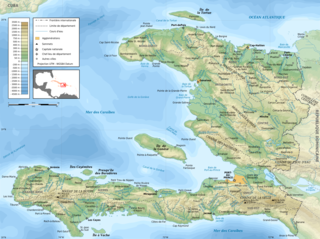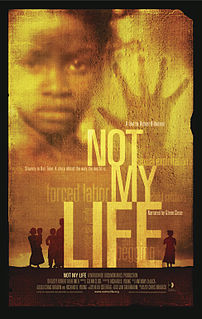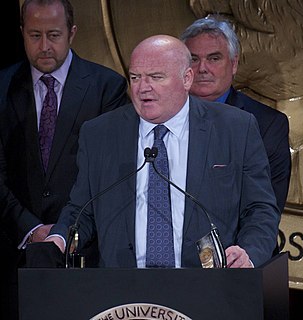
Sexual slavery and sexual exploitation is attaching the right of ownership over one or more people with the intent of coercing or otherwise forcing them to engage in sexual activities. This includes forced labor, reducing a person to a servile status and sex trafficking persons, such as the sexual trafficking of children.

Lake Volta, the largest artificial reservoir in the world based on surface area, is contained behind the Akosombo Dam which generates a substantial amount of Ghana's electricity. It is completely within the country of Ghana and has a surface area of 8,502 square kilometres. It extends from Akosombo in the south to the northern part of the country.

Sex trafficking is human trafficking for the purpose of sexual exploitation, including sexual slavery, which is considered a form of modern slavery. A victim is forced, in one of a variety of ways, into a situation of dependency on their trafficker(s) and then used by the trafficker(s) to perform sexual services to customers. Sex trafficking crimes can involve acquisition, transportation and exploitation; this includes child sex tourism (CST), domestic minor sex trafficking (DMST) or other kinds of commercial sexual exploitation of children, and prostitution.

International Justice Mission is an international, non-governmental 501(c)(3) organization focused on human rights, law and law enforcement. Founded in 1997 by lawyer Gary Haugen of the United States, it is based in Washington, D.C.. All IJM employees are required to be practicing Christians; 94% are nationals of the countries they work in.

The continent of Africa is one of the regions most rife with contemporary slavery. Slavery in Africa has a long history, within Africa since before historical records, but intensifying with the trans-Saharan and Indian Ocean slave trade and again with the trans-Atlantic slave trade; the demand for slaves created an entire series of kingdoms which existed in a state of perpetual warfare in order to generate the prisoners of war necessary for the lucrative export of slaves. These patterns have persisted into the colonial period during the late 19th and early 20th century. Although the colonial authorities attempted to suppress slavery from about 1900, this had very limited success, and after decolonization, slavery continues in many parts of Africa despite being technically illegal.

Contemporary slavery, also known as modern slavery or neo-slavery, refers to institutional slavery that continues to occur in present-day society. Estimates of the number of slaves today range from around 38 million to 46 million, depending on the method used to form the estimate and the definition of slavery being used. The estimated number of slaves is debated, as there is no universally agreed definition of modern slavery; those in slavery are often difficult to identify, and adequate statistics are often not available. The International Labour Organization estimates that, by their definitions, over 40 million people are in some form of slavery today. 24.9 million people are in forced labor, of whom 16 million people are exploited in the private sector such as domestic work, construction or agriculture; 4.8 million persons in forced sexual exploitation, and 4 million persons in forced labor imposed by state authorities. 15.4 million people are in forced marriage.

Human trafficking is the trade of humans for the purpose of forced labour, sexual slavery, or commercial sexual exploitation for the trafficker or others. This may encompass providing a spouse in the context of forced marriage, or the extraction of organs or tissues, including for surrogacy and ova removal. Human trafficking can occur within a country or trans-nationally. Human trafficking is a crime against the person because of the violation of the victim's rights of movement through coercion and because of their commercial exploitation. Human trafficking is the trade in people, especially women and children, and does not necessarily involve the movement of the person from one place to another.

Human trafficking is a modern form of slavery, with illegal smuggling and trading of people, for forced labor or sexual exploitation.

Costa Rica is a source, transit, and destination country for goods and products, a great location for trade in the seas. Costa Rica is surrounded by the Pacific Ocean and the Caribbean Sea making it a source of imports and exports. Costa Rica is approximately 19,653 square miles of land, making it smaller than West Virginia. To a lesser but increasing extent, Costa Rica is a source, transit, and destination country for men, women, and children subjected to conditions of forced labor, particularly in the agriculture, construction, fishing, and domestic service sectors. The economy greatly depends on the exportation of bananas and coffee, making high demands of agriculture work. Costa Rican women and children are forced into commercial sexual exploitation due to high rates of poverty and violence. Women and girls from Nicaragua, the Dominican Republic, Guatemala, Colombia, and Panama have been identified in as victims of forced prostitution. Child sex tourism is a serious problem, particularly in the provinces of Guanacaste, Limon, Puntarenas, and San José. Child sex tourists arrive mostly from the United States and Europe. Young men from Nicaragua, Vietnam, China and other Asian countries are subjected to conditions of forced labor in Costa Rica. Adults have been identified using trafficked women and children to transport and sell drugs. Neighboring countries and cities are victims as well to forced labor many times trafficked to Costa Rica.

The A21 Campaign is a global 501(c)(3) non-profit, non-governmental organization that works to fight human trafficking, including sexual exploitation & trafficking, forced slave labor, bonded labor, involuntary domestic servitude, and child soldiery. The organization was founded by Christine Caine, an international motivational speaker, in 2008. The A21 Campaign aims to "abolish slavery everywhere, forever," and focuses on combatting slavery around the world through educational awareness and prevention, the protection of victims, the prosecution of traffickers, and various partnerships. The A21 Campaign has branches in the Australia, Bulgaria, Cambodia, Denmark, Greece, Norway, Portugal, South Africa, Spain, Thailand, Ukraine, The United Kingdom, The United States and more.

Human trafficking in California is the illegal trade of human beings for the purposes of reproductive slavery, commercial sexual exploitation, and forced labor as it occurs in the state of California. It is widely recognized as a modern-day form of slavery. It includes "the recruitment, transportation, transfer, harboring or receipt of persons by means of threat or use of force or other forms of coercion, of abduction, of fraud, of deception, of the abuse of power, or of a position of vulnerability or of the giving or receiving of payments or benefits to achieve the consent of a person having control over another person, for the purpose of exploitation. Exploitation shall include, at a minimum, the exploitation of prostitution of others or other forms of sexual exploitation, forced labor services, slavery or practices similar to slavery, servitude or the removal of organs."

Slavery in Haiti started after the arrival of Christopher Columbus on the island in 1492 with the European colonists that followed from Portugal, Spain and France. The practice was devastating to the native population. Following the indigenous Tainos' near decimation from forced labor, disease and war, the Spanish, under advisement of the Catholic priest Bartolomé de las Casas and with the blessing of the Catholic church, began engaging in earnest in the 1900 kidnapped and forced labor of enslaved Africans. During the French colonial period beginning in 1625, the economy of Haiti was based on slavery, and the practice there was regarded as the most brutal in the world. The Haitian Revolution of 1804, the only successful slave revolt in human history, precipitated the end of slavery not only in Saint-Domingue, but in all French colonies. However, this revolt has only merited a marginal role in the histories of Portuguese and Spanish America. This is a problem as it should hold a much more central place due to the fact that its contribution to independence in the Americas is indisputable. Moreover, it is to this rebellion in Haiti that the struggle for independence in Latin American can be traced to. However, several Haitian leaders following the revolution employed forced labor, believing a plantation-style economy was the only way for Haiti to succeed, and building fortifications to safeguard against attack by the French. During the U.S. occupation between 1915 and 1934, the U.S. military forced Haitians to work building roads for defense against Haitian resistance fighters.

The Trafficking in Persons Report, or the TIP Report, is an annual report issued by the U.S. State Department's Office to Monitor and Combat Trafficking in Persons. It ranks governments based on their perceived efforts to acknowledge and combat human trafficking.

Not My Life is a 2011 American independent documentary film about human trafficking and contemporary slavery. The film was written, produced, and directed by Robert Bilheimer, who had been asked to make the film by Antonio Maria Costa, executive director of the United Nations Office on Drugs and Crime. Bilheimer planned Not My Life as the second installment in a trilogy, the first being A Closer Walk and the third being the unproduced Take Me Home. The title Not My Life came from a June 2009 interview with Molly Melching, founder of Tostan, who said that many people deny the reality of contemporary slavery because it is an uncomfortable truth, saying, "No, this is not my life."

Human trafficking in New York is the illegal trade of human beings for the purposes of reproductive slavery, commercial sexual exploitation, and forced labor. It occurs in the state of New York and is widely recognized as a modern-day form of slavery. It includes, "the recruitment, transportation, transfer, harboring or receipt of persons by means of threat or use of force or other forms of coercion, of abduction, of fraud, of deception, of the abuse of power, or of a position of vulnerability or of the giving or receiving of payments or benefits to achieve the consent of a person having control over another person, for the purpose of exploitation. Exploitation shall include, at a minimum, the exploitation of the prostitution of others or other forms of sexual exploitation, forced labor services, slavery or practices similar to slavery, servitude or the removal of organs."

Sex trafficking in the United States is a form of human trafficking which involves reproductive slavery or commercial sexual exploitation as it occurs in the United States. Sex trafficking includes the transportation of persons by means of coercion, deception and/or force into exploitative and slavery-like conditions, and is commonly associated with organized crime.

Tony Maddox is a British journalist. He was executive vice president and managing director of CNN International from 2003 until May 2019.
Sex trafficking in China is human trafficking for the purpose of sexual exploitation and slavery that occurs in the People's Republic of China. China, the world's most populous country, has one of the highest rates of human trafficking, including sex trafficking, in the world. It is a country of origin, destination, and transit for sexually trafficked persons.
Sex trafficking in the Philippines is human trafficking for the purpose of sexual exploitation and slavery that occurs in the Republic of the Philippines. The Philippines is a country of origin and, to a lesser extent, a destination and transit for sexually trafficked persons.
Nigeria has had a history of slavery and participation in the slave trade. Slavery is now illegal internationally and in Nigeria. However, legality is often overlooked with different pre-existing cultural traditions, which view certain actions differently. In Nigeria, certain traditions and religious practices have led to “the inevitable overlap between cultural, traditional, and religious practices as well as national legislation in many African states” which has had the power to exert extra-legal control over many lives resulting in modern-day slavery. The most commons forms of modern slavery in Nigeria are human trafficking and child labor. Because modern slavery is difficult to recognize, it has been difficult to combat this practice despite international and national efforts.









